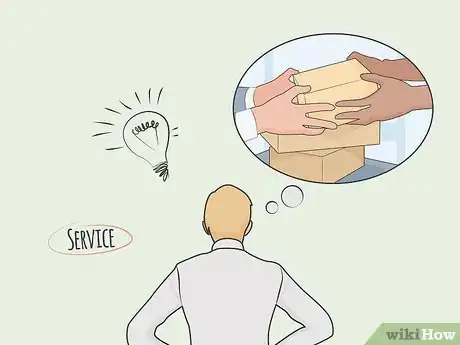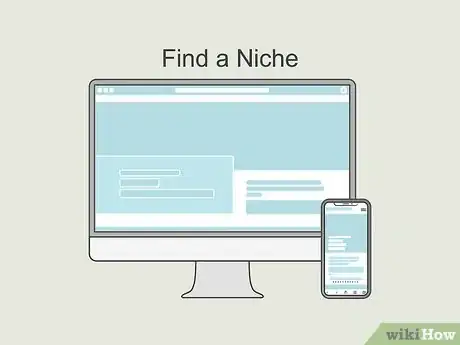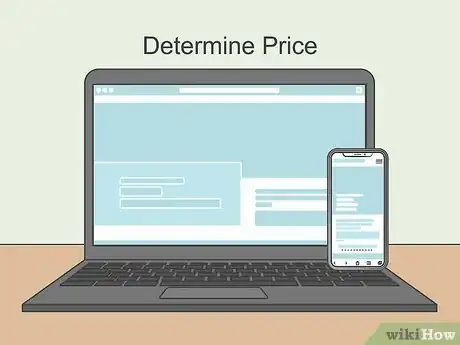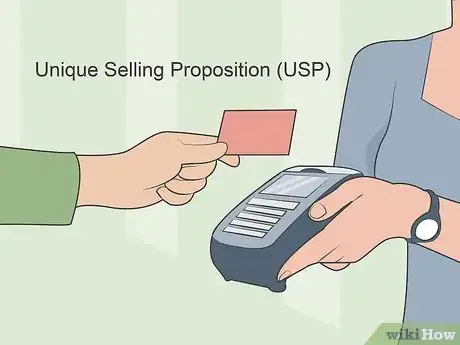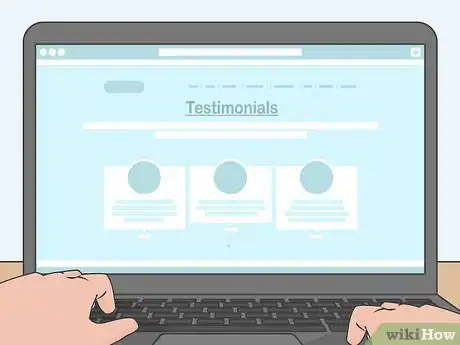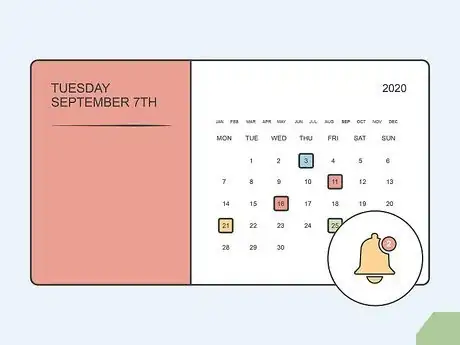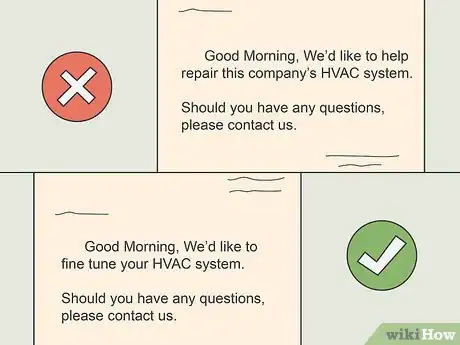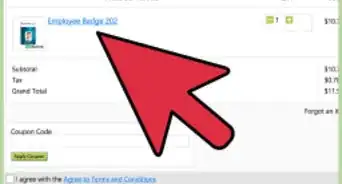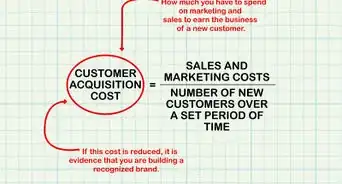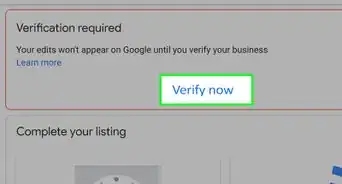This article was co-authored by Gina D'Amore and by wikiHow staff writer, Janice Tieperman. Gina D'Amore is a Financial Accountant and the Founder of Love's Accounting. With 12 years of experience, Gina specializes in working with smaller companies in every area of accounting, including economics and human resources. She holds a Bachelor's Degree in Economics from Manhattanville College and a Bookkeeping Certificate from MiraCosta College.
There are 16 references cited in this article, which can be found at the bottom of the page.
This article has been viewed 7,746 times.
Proper organization and unique business strategies are essential if you want to sell a service to new customers. While there’s no guaranteed way to be successful in the service industry, there are several ways you can set your own business apart in the professional field. First, make an effort to create a solid identity for your brand. Next, develop a concrete marketing and outreach plan for connecting with potential clientele. With the proper focus and preparation, you’ll be ready to put your best foot forward!
Steps
Establishing a Solid Brand Identity
-
1Identify yourself as the product that’s being sold. While you aren’t offering tangible goods to a business, remember that you’re selling something that’s just as valuable. With this in mind, try framing your service as a physical item that can be purchased. Use this change in your branding to better connect with your customers, and better address the possible needs of your clients.[1]
- For instance, instead of offering a printer repair service to potential clientele, label your service as: “Handy Printer Tune-up.”
-
2Differentiate yourself from the competition by finding a market niche. Go online and look up the websites of competing service businesses. See if there’s a specific niche in the market that your business can fill, making your service especially unique and irreplaceable. If you offer something that no other group brings to the table, you might distinguish yourself in the eyes of potential clients.[2]
- For instance, if your main line of work is designing websites, try expanding your business scope to also include mobile apps.
Advertisement -
3Observe your competitors to analyze them. Search for your competitors online to get an idea of their pricing and marketing schemes. Check on review websites to see how acclaimed these businesses are, and to study what they’re doing to please customers. Use this information to make adjustments to your own business policies, so your brand can become more reputable.[3]
- Try interacting with your competitors at a social gathering and other meet-ups to get a feel for how they run things.
- Generally, there are 3 types of competition: direct, secondary/indirect, and substitute. Direct competition sells the same service to the same group of customers, while secondary and substitute competition provide different services.
-
4Calculate the limits of your services before committing to a job. While it might be tempting to reach out to huge clients, look through your business’s books to see what kinds of jobs you can and can’t handle. Use your current labor force and past expense reports to figure out what kind of workload your business can manage. To make your business more marketable, try putting an individual in charge of studying other businesses who offer similar services to your own.[4]
- For instance, if your business only has 5 employees, it’s probably not a good idea to service a company with 2,000 employees.
- While studying other businesses, look for hidden services that these competing companies offer. If possible, try to replicate these services to make your own business more efficient and successful.
Did you know? While selling products and selling services appear to be similar tasks, these jobs have several key differences. Product selling focuses more on the individual item, while service selling focuses on satisfying a customer’s needs.
Selling services focuses much more the relationship between the client and the service provider.[5]
-
5Create a website for your business. Develop a web domain that clearly outlines the services you offer. Using separate webpages, describe your company’s mission, the services you offer, the pricing, and ways potential clients can contact you. Throughout your website, try to speak in a friendly, cordial tone that doesn’t use any aggressive sales pitches.[6]
- For example, as a mission statement, you could write something like this: “We’re dedicated to providing prompt, high-quality graphic designs to all of our clients.”
- While your website doesn’t need to be state-of-the-art, it should be easy to navigate.
- Try using a free website builder to design your web presence. For an extra fee, you can purchase a domain name on most sites.
-
6Print out a set of detailed business cards. Design a business card that includes all necessary information about your business or company. On the front, focus on creating a fun design or logo, along with your name, company name, email address, and phone number. On the back of the card, include any special qualifications that your business has.[7]
- By giving clients lots of avenues for communication, you’re creating a transparent identity for yourself.
- Always have a business card handy in case you meet a new client in a random place.
Marketing Your Services Effectively
-
1Choose a fair price for the services that you offer. Don’t undersell your service, even when you’re just starting out. Before putting your business on the market, calculate and stand by a price that fairly combines that supply cost and hourly labor that your service requires.[8] If a customer questions your pricing, remind them that you’re giving them a service that operates on both punctuality and convenience.[9]
- Stand by the value of the service you offer. Depending on your exact business, you’ll be helping customers get rid of a pesky, undesired situation, like a smudged window, outdated website, or broken printer.
- Look at your competitor’s price model to get an idea of the rate you should charge for your own services.
-
2Cater to the emotions of your potential clientele. Think about a customer’s mindset as they’re choosing a service for their business. Note that most clientele will value efficiency and convenience above all else. Keeping this in mind, try advertising your service as a cost-effective, convenient, and efficient way to solve the customer’s problem. If you make this message clear on your website and other marketing materials like fliers, you might get more customers![10]
- On any kind of marketing material, make sure that potential clientele know that your top priority is efficiency.
-
3Create a Unique Selling Proposition (USP) that appeals to the client. Try creating a USP, which describes the specific services that you offer. Since you’re trying to appeal to a variety of customers, make your USP something distinctive and memorable, so potential clientele don’t forget about your business. Display your USP on all of your marketing materials, including business cards, fliers, pamphlets, and other documents that you hand out to possible customers. Additionally, make sure that this selling point is clearly visible on your website.[11]
- Clients want to know exactly what they’re getting before committing to a service provider.
- For instance, this could be a great USP: “If you aren’t satisfied with our work, we’ll give you a full refund!”
-
4Use testimonials to boost your credibility. Ask past clientele to give a statement that you can use on different promotional materials, like your website. Tell your satisfied customers to state the best aspects of your service, and why they’d consider hiring you again. Next, include these testimonies on fliers, business cards, and any other place where you’re advertising your service.[12]
- New customers might be more inclined to contact you if they see past success stories.
- Try making a “Testimonial” tab or page on your website to include these positive customer reviews.
-
5Study buyer personas to understand who's investing in your service. Predict your interactions with future customers by envisioning the possible identities of your potential clientele. First, determine the specific information about your client, like their age, gender, and income. Next, try to zero in on the profession that this customer will hail from. Finally, focus on this customer’s communication style, and what they’re trying to achieve within their own business.[13]
- These personas can provide valuable insight into the best way to approach and pitch to a customer.
- For instance, if your buyer persona is an old-fashioned businessman, you might want to use physical letters and phone calls to reach him. If your buyer persona is a younger, modern businesswoman, opt for digital communication instead.
Expanding Your Clientele
-
1Request that your clients refer you to other businesses. Once you’ve successfully completed a service for a company, ask your satisfied clients to recommend you to their colleagues. Don’t worry about your request sounding tacky—instead, you’ll appear confident and self-assured of the quality that your business offers. While word-of-mouth referrals aren’t the most reliable way to get new clientele, you might be pleasantly surprised at the networking you can achieve.[14]
- Whenever you get a new customer, politely ask them how they heard about your services.
-
2Offer help without trying to make a sale. Look for news reports and other promotional materials that mention successful, well-established companies. Use these publications as a segue to call the company in question. During this phone call, mention the different services you can offer, and volunteer to email them a free resource. Without making a sales pitch, end the call to leave the potential client with a positive image of your business.[15]
- For instance, if you’re an event planner, consider emailing a potential client a resource on party or event preparation.
- Try saying something like this during the interaction: “Hello! I saw an ad for your company on the local news, and I just wanted to get in touch with you. I own an event planning business, and I have an informational fact sheet that I’d love to send your way.”
- While you’ll be making sales pitches later, you don’t want to create a pitch right off the bat.
-
3Take part in community events for the exposure. Around the holidays and other special days, see if your town or city is hosting any charity events or festivals. If businesses are allowed to participate in the event, register your group for a table or booth! Use the community event to speak and network with other businesses who are supporting the gathering.[16]
- For instance, if you run a card or stationery-making business, consider participating in a holiday festival.
-
4Schedule your corporate interactions based on the climate of different companies. Track certain businesses on Google, so you can keep an eye on the inner workings of your company. Research the different struggles and issues that the company is going through. If you’re planning on developing a sales pitch in the future, you can cater your content specifically towards the current events surrounding the company.[17]
- Try setting alerts on Google to keep an eye out for press releases and other news bytes.
- For instance, if you hear that a company is downsizing, make a pitch that highlights how budget-friendly your services are.
-
5Search for compatible companies that you could potentially work with. Go online to research the different businesses operating in your area. Look at these websites and study the mission statements to determine how the company operates. As you’re researching, search for ways that your own business can serve this company. If you have additional questions about the business, try reaching out to their customer service desk.[18]
- For instance, if you run a window cleaning service, you could focus on marketing yourself to businesses that operate out of an entire building instead of 1 office space.
- See if you can advertise your business in a trade magazine. If companies see you in the publication and like your potential services, they might contact you.[19]
-
6Try contacting a lower member of an organization when connecting with clientele. Instead of reaching out to the CEO of a company, try calling or emailing someone more approachable within the establishment. Search online for the contact info of a customer service director, or another person who works with the company’s outreach program. If you target the right person within the company, you’re more likely to be successful with your pitch.[20]
Providing Quality Customer Service
-
1Address potential clients like people, not businesses. Don’t refer to the client as a “company” in your various interactions. Instead, use the “you” pronoun frequently, which shows that you view your customers as people, and not businesses. Treat all potential clientele with kindness, and respect their wishes at the end of a cordial conversation.[21]
- If a business owner doesn’t want to work with you, respect their decision.
- Try saying something like “We’d like to fine tune your HVAC system” instead of “We’d like to help repair this company’s HVAC system.”
-
2Hire a strong sales team that is passionate about your service. Search for potential job candidates with magnetic and quirky personalities, as well as a pleasant, unforgettable attitude when selling services. Since you always want to have a great sales team in your company, be on the lookout for new candidates throughout the year. Don’t try to hire quickly; instead, work slowly and efficiently to hire someone properly.[22]
- In a job interview, ask questions like: “What do you like most about being a salesperson?” Listen to the responses carefully, and see who has a genuine passion for the position.
-
3Stay in close contact with past clients via email. Don’t leave your older clients behind after you’ve completed a job for them. Instead, continue calling and emailing to remind them of the different services that you can offer. While you don’t want to call or email these clients every day, try to reach out once every 2 weeks or so.[23]
- For instance, try saying something like this: “Hello! We recall that you had your property landscaped by us 3 weeks ago. Would you be interested in having any landscaping work done 6 months from now?”
-
4Give your clients special perks within your business. Remind your customers that you appreciate their patronage by giving them discounts on future services. Thank them for their support via phone or email, and take a moment to send them additional promotions, as well as access to new products or services that you offer. If you treat your clients with respect, they might promote you to other business owners![24]
- For instance, if you provide IT help on a frequent basis for a company, offer them a 25% discount on their next consultation.
References
- ↑ https://www.acuitymag.com/business/your-service-as-a-product
- ↑ https://www.acuitymag.com/business/your-service-as-a-product
- ↑ https://www.bdc.ca/en/articles-tools/marketing-sales-export/marketing/pages/how-evaluate-competition.aspx
- ↑ https://hbr.org/2008/05/how-to-sell-services-more-profitably
- ↑ https://www.uschamber.com/co/grow/sales/differences-in-selling-products-and-services
- ↑ https://www.mpamag.com/commercial/the-importance-of-having-a-company-website-189798.aspx
- ↑ https://www.entrepreneur.com/article/225962
- ↑ https://www.forbes.com/sites/forbesagencycouncil/2017/11/21/how-to-price-your-service/
- ↑ https://www.inc.com/bill-green/if-a-customer-says-your-product-or-service-is-too-expensive-this-is-what-you-should-say.html
- ↑ https://m.infoentrepreneurs.org/en/guides/know-your-customers--needs/
- ↑ https://www.entrepreneur.com/encyclopedia/unique-selling-proposition-usp
- ↑ https://www.iamagazine.com/strategies/read/2019/09/11/testimonials-3-steps-to-boost-credibility
- ↑ https://www.entrepreneur.com/article/312268
- ↑ https://www.sba.gov/blog/10-ways-get-new-customers
- ↑ https://www.inc.com/marla-tabaka/5-surprising-secrets-for-selling-to-corporate-clients.html
- ↑ https://www.sba.gov/blog/10-ways-get-new-customers
- ↑ https://www.inc.com/marla-tabaka/5-surprising-secrets-for-selling-to-corporate-clients.html
- ↑ https://www.inc.com/marla-tabaka/5-surprising-secrets-for-selling-to-corporate-clients.html
- ↑ https://www.entrepreneur.com/article/69902
- ↑ https://www.inc.com/marla-tabaka/5-surprising-secrets-for-selling-to-corporate-clients.html
- ↑ https://www.business.gov.au/People/Customers/How-to-communicate-with-customers
- ↑ https://hbr.org/2008/05/how-to-sell-services-more-profitably
- ↑ https://www.sba.gov/blog/10-ways-get-new-customers
- ↑ https://www.sba.gov/blog/10-ways-get-new-customers
- ↑ https://hbr.org/2008/05/how-to-sell-services-more-profitably
